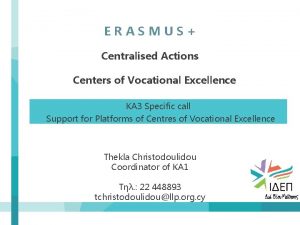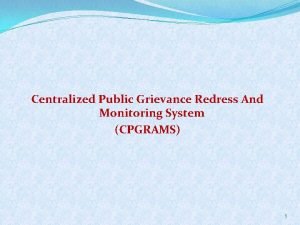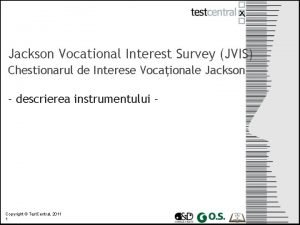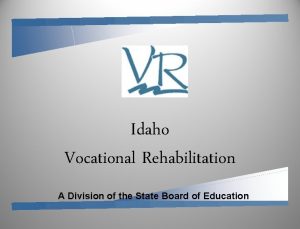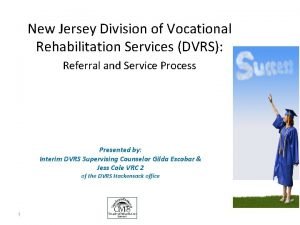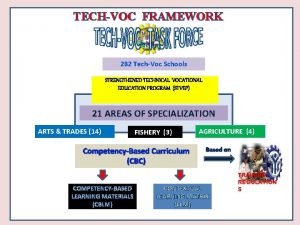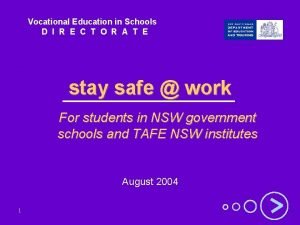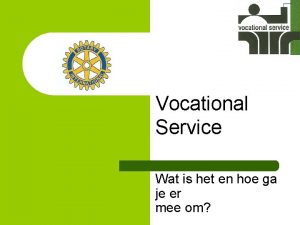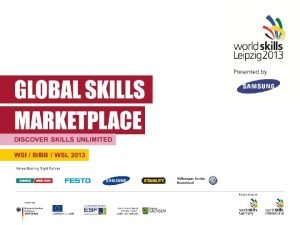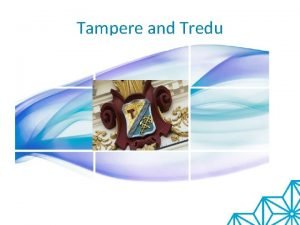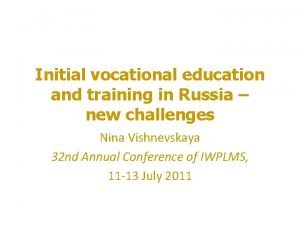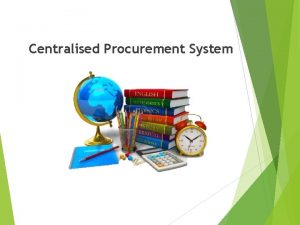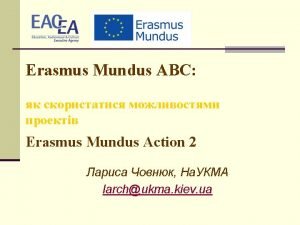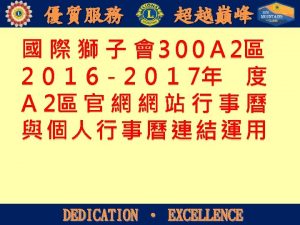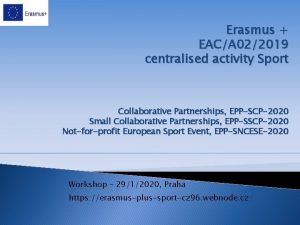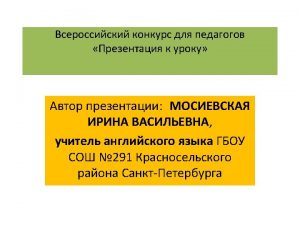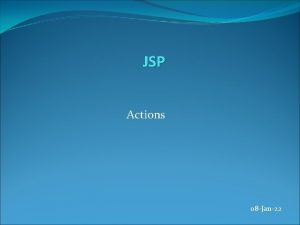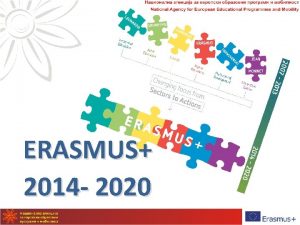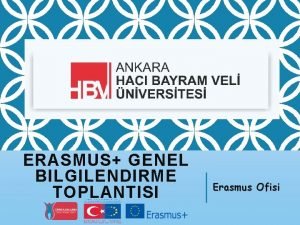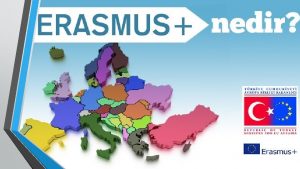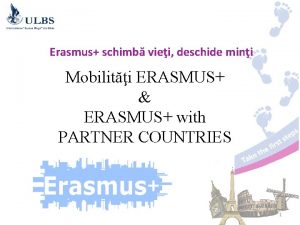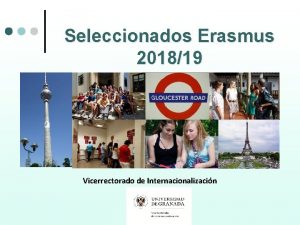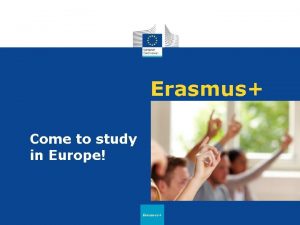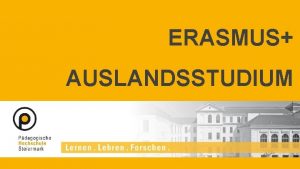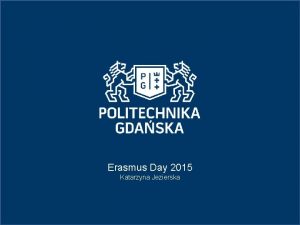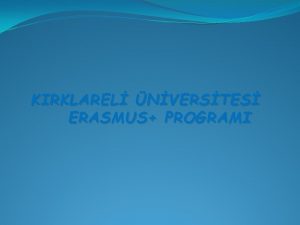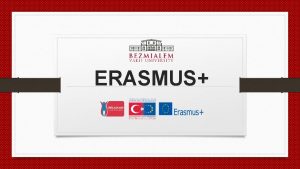ERASMUS Centralised Actions Centers of Vocational Excellence KA























- Slides: 23

ERASMUS+ Centralised Actions Centers of Vocational Excellence KA 3 Specific call Support for Platforms of Centres of Vocational Excellence Thekla Christodoulidou Coordinator of KA 1 Τηλ. : 22 448893 tchristodoulidou@llp. org. cy

Centers of Vocational Excellence Τhe Objective Support the establishment and development of transnational cooperation platforms of Centres of Vocational Excellence (Co. VEs) Connect existing Co. VEs in different countries that currently operate in a local context or link well established Co. VEs in one country with partners in other countries that intend to develop Co. VEs No intention to build new VET institutions and infrastructure from scratch

Centers of Vocational Excellence Τhe Initiative Foster European Vocational Excellence at two levels LOCAL / REGIONAL / NATIONAL Through Centres of Vocational Excellence (Co. VE) Operating in a given local context, embedding them closely in the local innovation and skills ecosystems, working with businesses, chambers, tertiary education, research institutions, public authorities, etc. INTERNATIONAL Through Platforms of Co. VE's to establish world -class reference points for VET by bringing together partners that share a common interest in: Specific sectors/trades - such as aeronautics, emobility, green technologies, healthcare, textiles… Societal challenges - such as integration of migrants, Digitalisation, AI, SDG, upskilling and reskilling…

3 Key Success Factors 1. Strong and enduring partnerships - between the VET community, businesses and universities in which interactions are reciprocal and mutually beneficial (Not one time funded projects) 2. Anchored into frameworks of regional development, innovation and smart specialisation - allows for the identification of synergies between policies and amongst stakeholders (not seen in isolation) 3. Integration of activities - Co. VEs achieve more than sum of the parts (Providing qualification is not enough, it already exists in VET)

Platforms of Vocational Excellence On what will they cooperate? Platforms connecting training providers, their networks, and chambers, for: Capacity-building, sharing experience and know-how among partners Internationalisation strategies for mobility of learners, staff, VET leaders Innovative teaching and training methods (building on Digitalisation) Anticipating future skill needs Developing Joint VET curricula Project based learning Trans-national applied research projects Sharing of resources and equipment Active in trans-national Knowledge triangle

Who can participate? Natural persons are NOT eligible. Only organisations with legal status such as: Initial and continuing VET providers Tertiary education institutions (incl. universities of applied sciences and polytechnics) Research institutions Science parks Companies Social enterprises Chambers and their associations Social partners Sectoral skills councils Professional/sector associations National/regional authorities Public employment services

Minimum requirements for an eligible partnership 8 full partners From at least 4 Programme Countries and at least 2 EU member states Each country must involve at least: - 1 company/industry or sector representative (chambers or trade associations) - 1 VET provider from upper secondary/post secondary non-tertiary and/or tertiary level, covering all EQF levels from 3 -8 (Activities cannot target learners only at tertiary level) Associated Partners are eligible from Programme & Partner Countries if their added value is fully justified (No budget foreseen for Associated Partners)

Project Duration 4 Years Shorter or longer period projects are not eligible Activities must start on 1 October 2020 or 1 November 2020 Activities of projects clustered in 3 groups 1. Teaching and Learning 2. Cooperation and Partnerships 3. Governance and Funding

Activities related to Teaching and Learning 1) Lifelong learning continuum approach. Combining offers of initial VET qualifications, with offers of continuing training for upskilling and reskilling 2) Providing guidance services, as well as validation of prior learning 3) Innovative curricula that focus both on technical skills and key competences 4) Innovative learner-centred teaching and learning methodologies 5) Fostering learner excellence through actions that incentive VET learners to explore their innovation and creative potential 6) Developing modular and learner-centred trans-national VET learning provision 7) Providing higher level VET programmes and developing flexible pathways and cooperation mechanisms between VET and higher education institutions 8) Initial and continuing professional development of teachers and trainers 9) Establishing strong quality assurance mechanisms (certification based on national/international standards e. g. ISO 21001 or EFQM) 10) Establishing effective feedback loops and graduate tracking systems

Activities related to Cooperation and Partnerships 1) Creation and dissemination of new knowledge in partnership with other stakeholders, e. g. through joint R&D with universities, R&D units in companies 2) Establishing business-education partnerships for apprenticeships, internships, sharing of equipment, exchanges of staff and teachers, etc. 3) Providing SMEs with technical support, needs assessment, as well as tailor-made training to support their offers for apprenticeship and up-skilling/re-skilling 4) Working together with local SME's through innovation hubs, technology diffusion centres, and applied research projects 5) Providing or supporting business incubators for VET learners to develop their entrepreneurship skills and initiatives 6) Developing internationalisation strategies to foster learner/staff mobility 7) Campaigns and activities aimed at raising the attractiveness of VET 8) Participating in national and international skills competitions 9) Developing "International VET campus/academies"

Activities related to Governance and Financing 1) Ensuring effective governance at all levels involving relevant stakeholders, particularly companies, chambers, professional and sector associations, national and regional authorities and social partners 2) Actively engaging in the overall national Skills governance systems and linking with employment and social policies at local, regional, national and European level 3) Integrating into economic and innovation strategies and systems at local, regional, national and EU levels to proactively co-shape innovation and growth 4) Developing sustainable financial models that combine public and private funding, as well as income generating activities 5) Supporting the attraction of foreign investment projects by ensuring timely provision of skills for companies investing locally 6) Making full use of national and EU financial instruments and Funds

Eligible activities at least 3 activities from Cluster 1 Teaching and learning at least 3 activities from Cluster 2 Cooperation and partnership at least 2 activities from Cluster 3 Governance and funding EQF 3– levels 8 EQF levels Starting date: 1 st October or 1 st November 2020 Duration: 4 years Place: EU MSs + Non EU Programme countries

Available Budget BUDGET AVAILABLE 20 Mio € MAX. EU CO-FINANCING 80% MAX. EU GRANT PER PROJECT 4 Mio € Approximately 5 projects will receive funding in 2020 Call

Award Criteria Points 1. Relevance of the project 35 points (threshold minimum 18) 2. Quality of the project design and implementation 25 points (threshold minimum 13) 3. Quality of the project consortium and cooperation arrangements 20 points (threshold minimum 11) 4. Impact and dissemination 20 points (threshold minimum 11) Applications must score at least 70/100 points to be considered for funding

Relevance of the project Link to policy Consistency Innovation Regional dimension Cooperation and partnership European added value Internationalisation Digital skills Green skills Social dimension

Quality of project design & implementation Coherence Methodology Structure Management Budget Financial & quality control

Quality of project consortium & cooperation arrangements Configuration Upward convergence Geographical dimension Commitment Tasks Collaboration

Impact & dissemination Exploitation Dissemination Impact Sustainability

Timetable Stages Date/Time/ Indicative Period a. Publication of the call October 2019 b. Deadline for submission of applications 20/2/2020 – 17: 00 (Brussels time) c. Evaluation period February – June 2020 d. Results’ notification to applicants July 2020 e. Signature of Grant Agreements August – September 2020 f. Starting date of the action 1/10/2020 or 1/11/2020

Eligible Costs – Budget Tables • • Sheet 1: Consolidated Budget Sheet 2: A. Staff Sheet 3: B 1. Travel & subsistence Sheet 4: B 2. Equipment Sheet 5: B 3 Subcontracting Sheet 6: B 4 Other Sheet 7: Indirect costs • Sheet 8: Revenue (sources) (summary sheet) (The number of working days will be validated) (for staff members) (rent, purchase, lease) (specific tasks not performed by the consortium) (Audit certificate, dissemination, T&S non-staff, …) (flat rate up to 7% of the eligible costs; => costs related to general administration of the project incurred by the beneficiary) (Grant /Co-financing - own funding /other)

Application Submission Electronic submission (Use of eforms) https: //eacea. ec. europa. eu/erasmus-plus/funding/ka 3 -centers-ofvocational-excellence_en Organization ID/PIC number are required Annexes to be attached: - Detailed description of the project - Declaration of honour - Estimated budget Applications can be submitted in all EU languages Deadline for submission: 20/2/2020 (17: 00 Brussels time)

Questions & Answers Contacts at the EACEA – Unit A 5 EACEA-EPLUS-VET@ec. europa. eu

 Centers of vocational excellence
Centers of vocational excellence Centralized public grievance redress and monitoring system
Centralized public grievance redress and monitoring system Uwa it service desk
Uwa it service desk Criticisms of vocational education sociology
Criticisms of vocational education sociology Jvis test
Jvis test Ffa 1969
Ffa 1969 Bvr las vegas
Bvr las vegas Vocational rehabilitation idaho
Vocational rehabilitation idaho Dvr new jersey
Dvr new jersey Tech voc definition
Tech voc definition Vocational profile
Vocational profile Whats technical school
Whats technical school Vocational senior high school
Vocational senior high school Vocational planning
Vocational planning Hazard vocational school
Hazard vocational school Vocational service
Vocational service Types of vocational courses
Types of vocational courses 1917 ffa history
1917 ffa history Importance of vocational education
Importance of vocational education Tredu tampere
Tredu tampere A sub-culture group
A sub-culture group Vocational education in russia
Vocational education in russia Technical and vocational meaning
Technical and vocational meaning Mention two defects of present curriculum
Mention two defects of present curriculum
